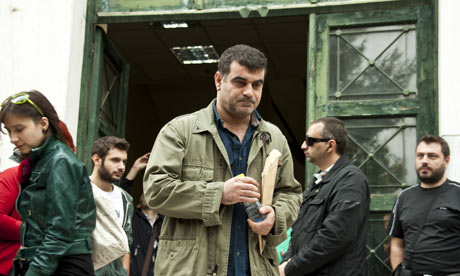Julian Borger guardian.co.uk, Monday 29 October 2012 19.44 GMT
Tension rises between Greek government and media after TV presenters are suspended over criticism of public order minister
Greek journalist Kostas Vaxevanis, centre, emerges from an Athens court after his trial was adjourned. Photograph: Demotix/Corbis/Stathis Kalligeris
Greek journalists have warned that press freedom was under unprecedented attack, with critics being suspended or put on trial by a precarious coalition government struggling to push through an economic austerity programme as a way of attracting foreign funds.
The clash between the government and the press appeared to be nearing a crisis with a strike due to start on Tuesday on state television (ERT) over the suspension of two popular presenters for mild criticism of a minister. Meanwhile, the editor of an investigative magazine went on trial on Monday for publishing a list of some 2,000 wealthy Greeks with Swiss bank accounts who the government has yet to investigate for possible tax evasion.
Dimitris Trimis, the head of the Athens Newspaper Editors Union said the current pressure on press freedom was the most intense of his career. "This is a matter of democracy," Trimis said. "The government feels insecure. The only way it feels it can convince society of its policies is to try to manipulate the media through coercion.
"This is true of both state television and in the private sector of the media where there has been a large number of lost jobs and wage cuts and so it has become easier to manipulate in the interests of the government and the economic elite."
Marilena Katsimi and Kostas Arvanitis were summarily dropped from their morning magazine programme on ERT after discussing the reaction of the public order minister, Nikos Dendias to a Guardian report on claims by anti-fascist demonstrators that they had been tortured by the police. Katsimi said on air that Dendias had not carried out his threat to sue the Guardian over the article because the medical examiners report "shows that there was indeed a crime." She described Dendias's actions as "strange" but did not think he would resign.
"About an hour after the programme ended, the director of information called for a transcript. He didn't ask to talk to us. And it was then announced that two other journalists would present tomorrow's show. We were cut," Katsimi told the Guardian.
"The style of the programme is very informal. It is a morning conversation over a cup of coffee and it is very popular with high ratings. We have been critical of ministers in the past from all parties, and there have been complaints to the management before but this is new. This is threat to public and private media."
Katsimi said the journalists' suspension was one of several "peculiar things" to have happened at ERT recently. "Everywhere in media people are being fired, but at ERT they are hiring. The government want people who agree with their position and they want to hire their friends."
ERT journalists are planning an initial two-hour strike from 6am on Tuesday, to be followed by 24-hour strikes until the suspension of Katsimi and Arvanitis is revoked.
Aimilios Liatsos, ERT's general director for news issued a statement on Monday claiming that the two journalists had "violated the basic rules of journalistic practice". He added that they had made "unacceptable insinuations" against Dendias without giving him an opportunity to express his view, "while their comments appeared to anticipate the results of a court decision".
Another prominent journalist, Kostas Vaxevanis, went on trial on Monday for publishing a leaked list of about 2,000 wealthy Greeks with Swiss bank accounts, who may face investigation for tax evasion.
The list was seized from a computer technician at HSBC bank in Geneva, who was suspected of trying to sell it, and was originally supplied to the Greek government in 2010 by the then French finance minister, Christine Lagarde, now head of the International Monetary Fund. However, the Greek finance ministry failed to act on the list for two years before it was leaked to Vaxevanis's Hot Doc magazine.
The case has triggered an uproar in Athens, where the speed of Vaxevanis arrest and trial – within three days of charges being pressed – has been contrasted with the many years it has taken the government to pursue rich Greek tax evaders.
On emerging from court where the trial was adjourned, Vaxevanis was greeted by cheers from a crowd of about 250, mostly journalists.
"I was doing my job in the name of the public interest," the journalist said. "Journalism is revealing the truth when everyone else is trying to hide it."
The Vienna-based Organisation for Security and Co-operation in Europe expressed concern about the Vaxevanis's brief arrest on Sunday. "I am relieved that Vaxevanis was released from custody after a brief detention, and trust that he will now be tried in a transparent manner considering the acute public interest in the case," OSCE media freedom representative Dunja Mijatovic said.
"It is the responsibility of media as the watchdog of democracy to disclose information in the public interest, even if it is considered sensitive by some."
Greek journalists warn over press freedom | World news | guardian.co.uk
![The [Greek] European Tragedy](https://blogger.googleusercontent.com/img/b/R29vZ2xl/AVvXsEiWKI5s90SFm1wWTk6bs4p7CgslaC2SnYPsrZhb-B-smOufNNCSxCvpBLI9hOB-LsXZjir_PNmEiMk2-E62F3xkg96IoC6QFAaZAnPRTVH340IN9WBRmWJqPkjWlgyRj3zpALp7h6hvA58/s920/GkBack_new.jpg)
